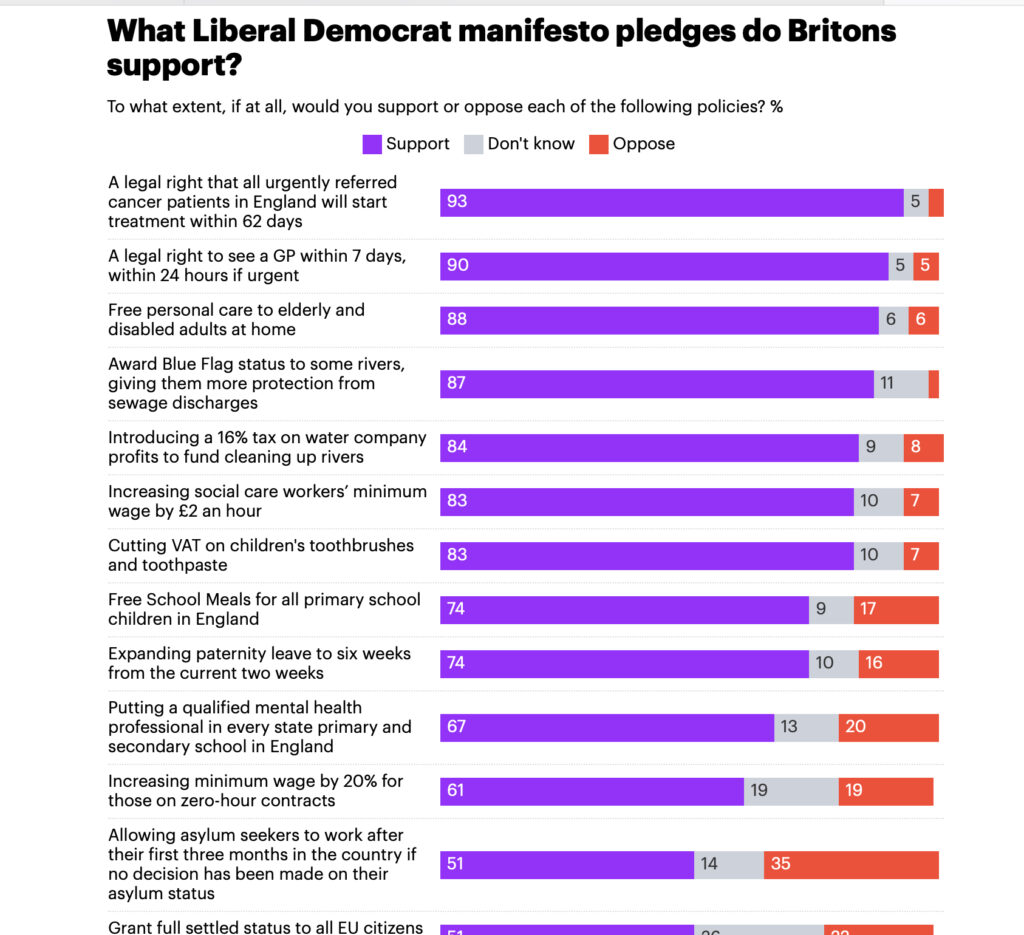Update: This article has been updated to include the Green Party’s policies on social care.
As a disabled person who relies on social care for the basics in life that many take for granted—such as help with getting out of bed in the morning, getting dressed, washed, eating, and going to the toilet—I have been charged hundreds of pounds a month by my local council for this essential help. Furthermore, means testing prevents me from saving for my future with a cap on the amount of savings allowed.
With this unfairness in the forefront of my mind, it will come as no surprise that of all the various policies put forward by the main political parties at the General Election on 4th July, it is their policies on social care that are pivotal for determining my quality of life and access to essential services.
Given the importance of these issues, evaluating the policies on reforming social care in England proposed by the Conservative, Labour, Liberal Democrat, Reform UK, and the Green parties is vital. Here’s my perspective on their policies and what they could mean for disabled social care users.
The current state of social care for disabled people
In a word, the current state of social care for disabled people in England is dire. Many, already living in poverty, are forced to pay significant portions of their limited income for basic care services, including getting out of bed, going to the toilet, or having a wash. This financial burden, effectively a tax on disability, traps many in a cycle of poverty, eroding their quality of life and aspirations. Local councils, struggling with underfunding from central government, impose these charges, which can consume up to 40% of a person’s income.
If this wasn’t bad enough, a number of cash-strapped councils have been referring thousands of people to debt collection agencies for unpaid care charges, worsening the financial and emotional strain on vulnerable members of the population.
Unpaid carers, who are the backbone of the social care system, face their own set of challenges. Often unseen and unheard by politicians, they are penalised for minor errors in benefits administration, leading to severe financial and psychological distress. A recent report highlighted that nearly 30,000 carers were asked to repay sums due to minor earnings breaches, showcasing a system more focused on penalisation than support.
This systemic neglect exacerbates the strain on the NHS. Inadequate social care leads to avoidable hospitalisations and delayed discharges, creating a bottleneck that affects the entire healthcare system. The lack of proper support for disabled people and their carers places additional pressure on hospitals, further highlighting the urgent need for comprehensive social care reform.
Against this troubling backdrop, what are the key promises that the main political parties are making to disabled people who rely on social care services during this General Election?
Conservative social care plans: stability or uncertainty?
The Conservatives have pledged multi-year funding for local authorities to support social care and implement reforms from the “People at the Heart of Care” white paper. They plan to cap social care costs at £86,000 for individuals’ lifetime personal care from October 2025. However, the Institute for Fiscal Studies (IFS) has said that no new funds have been allocated for these reforms, rendering them unfunded. This lack of financial backing creates uncertainty about the implementation and potential impact on service quality, risking inadequate care provision and increased uncertainty for those relying on these services.
Over 14 years, the Conservatives have failed to reform social care, and with their cuts to local councils during the austerity years, they have actually made things worse. Boris Johnson promised to “fix the crisis in social care” in 2019. But Liz Truss cancelled a planned national insurance rise in her disastrous mini-budget, and her successor, Rishi Sunak, delayed changes to the rules and thresholds for care charges until 2025.
Labour’s vision for a national care service
Labour’s manifesto proposes creating a National Care Service to deliver consistent care across the country, supported by national standards. The party promises a fair pay agreement for care workers with every care worker in England entitled to pay of at least £12 an hour as part of a drive to improve recruitment in social care and ease the burden on the NHS. Labour also indicates it will implement a cap on social care costs from October 2025. It emphasises building consensus for long-term reform to create a sustainable National Care Service.
However, while Keir Starmer’s party has promised to provide councils with multi-year funding settlements – a pledge also made by the Conservatives – there is no commitment to address overall funding levels, despite the Local Government Association warning councils in England face a £6.2bn funding deficit over the next two years.
Disappointingly, there is nothing in Labour’s plans to end the scandal of social care charging and disabled people chased by debt collectors, and hauled through the courts, by councils for unpaid care charges. This includes by Labour-run Tameside Metropolitan Borough Council in deputy Labour leader Angela Rayner’s constituency.
Liberal Democrats’ ambitious social care reforms
The Liberal Democrats offer the most comprehensive set of social care policies. They plan to introduce free personal care, following Scotland’s model, and establish a cross-party commission to secure sustainable funding. Their manifesto includes creating a national care agency to set minimum standards, developing a workforce plan, and establishing a Royal College of Care Workers. They also advocate for a carer’s minimum wage, increased Carer’s Allowance, guaranteed respite breaks, and recognising caring as a protected characteristic under the Equality Act 2010. The party says these measures offer robust support to carers and aim to professionalise the care workforce, which could significantly improve the quality of care we receive.
The Lib Dems also plan to trial “personal health and social care budgets” to give people control over their care, though details are still unclear. The party promises to set up an Independent Living Taskforce to help people live independently in their own homes and enable disabled people to transfer their care package to another local authority, preventing them from feeling stuck due to their care needs.
Liberal Democrat leader Ed Davey has a disabled son, which has featured in a video in the party’s election campaign. Many found the video moving and his interest in social care genuine. He gets it.
Yet the financial viability of the Liberal Democrats’ proposals remains in question. Care organisations and other experts have questioned the calculations. The King’s Fund think tank, for example, does not think £2.7bn is enough to “put social care back on a sustainable footing”.
It is worth noting that over the past 14 years the Lib Dems, when they were in coalition with the Conservatives, do bear some responsibility for the failures of those years, including an attack on local government funding, with the social care system among the victims.
Reform UK’s social care proposals
It seems hardly worth mentioning Reform UK as their plans ‘don’t add up’ and costings are out ‘by tens of billions of pounds per year’, according to the IFS, and other leading economists. The limited company has also said it has no ambition to win this election.
However, in terms of social care specifically, Reform UK proposes a Royal Commission of Inquiry into the social care system to develop a national plan involving central government, local authorities, social care providers, and support groups. They aim to simplify funding through a single stream and improve regulation. Reform UK also focuses on addressing tax avoidance by large care home providers and ensuring better wages for care staff. Overall, like others, their plans for social care lack details.
Green Party policies on social care
The Green Party, though having only one MP in the last Parliament, wields influence in local government with over 800 councillors, compared to Reform UK’s eight. Green Party candidate in Colchester, Sara Nicola Ruth, who has a disability, got in touch and highlighted the party’s “fully costed” social care policies outlined in their manifesto.
The Greens propose several measures to enhance social care, including a £20bn investment to:
• Introduce free personal care, as implemented by the Scottish Government, ensuring dignity for elderly and disabled people .
• Increase pay rates and establish a career structure for carers to revitalise the care workforce.
For those living in residential settings, the Greens pledge that personal care elements will be fully funded, alongside a tapered approach to other costs based on the level of income.
A personal perspective
In our cynical world, it often seems that no one trusts politicians or believes their promises. Adding to this is a feeling among many disabled people that they are forgotten and left behind by those in power. However, I have an antidote to share that proves the opposite. While writing this article, I was contacted by Labour-run Westminster City Council and discovered some positive changes in social care charges for disabled people in this borough.
When I first started receiving care here 25 years ago, under a Tory administration, my charge was £260 a month. By the time Labour took control of the council in 2022, it had risen to £360 a month. Many might not realise that disabled people have to pay this contribution towards their care on top of council tax and all the other taxes we pay. That’s £360 a month I need to find that non-disabled people don’t need to think about, amid all their other expenses in a cost-of-living crisis.
In 2023, soon after Labour took control of Westminster City Council after decades of Tory rule, I met with the cabinet member for social services and exchanged emails with the council leader. They assured me they were reviewing social care charges and carers’ pay. Now, I have just been told my social care charge is set to reduce to £76 a month, a significant cut due to Labour’s decisions over the past two years. They’ve also increased carers’ hourly pay to £13.15 an hour, an ethical rate for London. These are very positive and progressive changes.
I’m furious that the Tories made me pay hundreds of pounds a month on top of council tax for the past 25 years due to their political choices. I have been lucky because many people on benefits face social care charges that eat up to 40% of their limited income, just for basic care. This is immoral, and an absolute poverty trap.
This positive approach to the charge is starting to happen in other London councils as well. Tower Hamlets and Hammersmith and Fulham are promising free social care next year. Nationally, Labour are saying very little on social care reform, probably out of fear of damaging their election chances and facing attacks from the Tories on spending. Despite the cynicism, politics can positively impact our lives, and my experience here in Westminster is certainly a lesson for Labour nationally.
Conclusion: guidance for disabled social care users
As disabled people relying on social care, making an informed decision at the ballot box is crucial. Like non-disabled people, disabled voters have diverse political affiliations and will consider a range of issues, including access to transport and reform of Personal Independence Payments, and maybe even tactical voting just to get the Tories out. However, for many severely disabled people, social care can make or break lives, placing it at the forefront of our minds.
It is clear from their manifestos that both the Conservatives and Labour have taken the “too difficult to fix” approach to social care reform, which will serve to exacerbate the misery for the estimated one million people receiving long-term social care in England, and their families. As one person told me recently, it is an unforgivable betrayal.
Caring has been in the shadows too long and there is a real disconnect between what the Conservatives and Labour say they will do about social care and what the public thinks.

Their political cowardice on social care reform is out of step with the public mood and what a well functioning society requires. A YouGov poll recently showed 88% of voters back the Liberal Democrat policy of free personal social care. It has always been my opinion that social care should be provided on NHS terms free at the point of use for everyone who needs it. You can’t run the NHS effectively without a proper functioning and fair social care system.
While Ed Davey’s party has little chance of forming a government, a strong Liberal Democrat presence in opposition could influence positive change. Their progressive policies align more closely with Labour, potentially fostering a coalition on social care reform in the next Parliament that champions progressive change. A strong showing for the Lib Dems, with support for the Greens at the General Election, could therefore be beneficial for disabled social care users, pushing for the progressive changes to social care we urgently need.
Do you rely on social care from your local council? Tell us who you will be backing at the General Election in the comments below.
For further insights on the current state of social care in England, you can read my previous article from March on the urgent need for social care reform.






